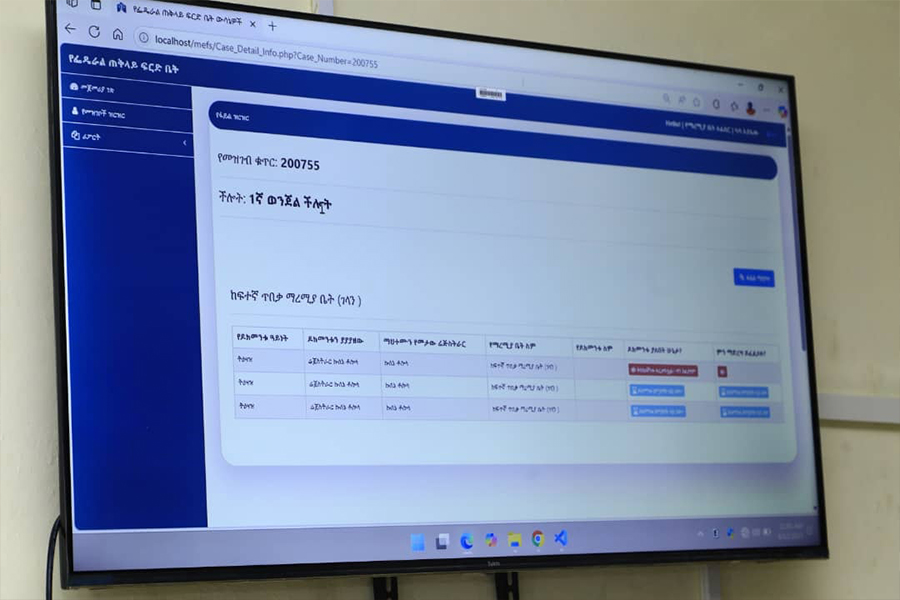
Editorial | Oct 12,2024
Jul 20 , 2024
By Desalegn Tegabu
The economy is creating opportunities for young Ethiopian professionals stepping into managerial roles. While technical expertise is valuable, transitioning from individual contributors to leaders requires a momentous mindset shift. Crucial changes are essential for new managers to embrace for success.
In the past, success might have been measured by daily task completion. However, new managers are required to adopt a strategic perspective, anticipating future challenges and crafting a clear vision aligned with organisational goals. Ethiopia's rapidly evolving environment demands an ability to navigate uncertainties and steer teams toward long-term success. For instance, a young manager in the e-commerce sector who anticipates consumer trends and logistical disruptions can develop a strategic plan for sustainable growth.
Effective leadership transcends technical expertise. Soft skills become paramount, such as understanding diverse work styles, building trust, and providing constructive feedback. Delegation and coaching are crucial for unlocking team potential. In Ethiopia's evolving work culture, these soft skills are vital for building trust within teams where respect for elders is deeply ingrained. A young manager leading a team that includes seasoned veterans and recent graduates can leverage these skills to create an inclusive environment where everyone feels valued and contributes their unique perspectives.
As managers, relationships transform. They guide teams, collaborate with peers, and report upwards. Building strong, effective relationships across these levels is key. This involves clear communication tailored to different audiences and adapting management styles to individual needs. Cultivating an inclusive environment where everyone feels heard is crucial for building strong team spirit.
However, micromanagement stifles innovation and morale. New managers should transition to an advisory role, guiding and supporting their team rather than dictating every move. Trusting employees promotes a culture of empowerment, leading to increased ownership, higher engagement, and better results. Empowerment is especially important in Ethiopia's growing economy, where retaining skilled workers is critical. By trusting employees and giving them ownership, young managers create a positive work environment where employees feel valued and motivated.
Effective management also involves investing in the team, including coaching, setting clear goals, monitoring progress, and providing timely feedback. By investing in their team's development, young managers create a culture of continuous learning that emphasises collective success. When team members have a strong foundation of skills and feel supported in their growth, they are better equipped to handle challenges and work together towards shared goals.
No less is accountability a cornerstone of leadership. New managers should move from a "me" to a "we" mentality. This involves encouraging open communication, promoting problem-solving skills, and creating a system where successes are celebrated as a team. Young managers tap into a powerful motivator in Ethiopia's collectivist culture by nurturing a sense of shared responsibility and ownership. Imagine a young sales manager implementing a team-based incentive program, encouraging collaboration and a sense of shared purpose that ultimately leads to improved performance.
By embracing these crucial mindset shifts, new managers in Ethiopia can confidently navigate their roles, cultivate positive work environments, and drive long-term success for their organisations. These young leaders, armed with strategic thinking, strong soft skills, collaborative relationships, a belief in empowerment, and a focus on collective ownership, could be well-positioned to contribute to Ethiopia's thriving business landscape.
The transformation of Ethiopia's managerial terrain shows the importance of these shifts. As more young professionals step into leadership roles, their ability to adapt and grow will be instrumental in sustaining the country's economic momentum. In an environment where the pace of change is accelerating, the success of these new managers will depend on their capacity to think strategically, build effective relationships, and promote a culture of continuous improvement.
The future of Ethiopia's business sector looks promising, with a new generation of leaders ready to meet the realities that lie ahead.
PUBLISHED ON
Jul 20,2024 [ VOL
25 , NO
1264]


Editorial | Oct 12,2024

Radar | May 18,2019

Radar | Dec 02,2023

Fortune News | Jul 19,2025

Fortune News | Feb 20,2019

Viewpoints | May 29,2021

My Opinion | Sep 16,2023

Radar | Jan 09,2024

Radar | Sep 19,2020

Radar | Oct 12,2024

Photo Gallery | 176124 Views | May 06,2019

Photo Gallery | 166338 Views | Apr 26,2019

Photo Gallery | 156788 Views | Oct 06,2021

My Opinion | 136876 Views | Aug 14,2021

Dec 22 , 2024 . By TIZITA SHEWAFERAW
Charged with transforming colossal state-owned enterprises into modern and competitiv...

Aug 18 , 2024 . By AKSAH ITALO
Although predictable Yonas Zerihun's job in the ride-hailing service is not immune to...

Jul 28 , 2024 . By TIZITA SHEWAFERAW
Unhabitual, perhaps too many, Samuel Gebreyohannes, 38, used to occasionally enjoy a couple of beers at breakfast. However, he recently swit...

Jul 13 , 2024 . By AKSAH ITALO
Investors who rely on tractors, trucks, and field vehicles for commuting, transporting commodities, and f...

Oct 18 , 2025
The political establishment, notably the ruling party and its top brass, has become p...

Oct 11 , 2025
Ladislas Farago, a roving Associated Press (AP) correspondent, arrived in Ethiopia in...

Oct 4 , 2025
Eyob Tekalegn (PhD) had been in the Governor's chair for only weeks when, on Septembe...

Sep 27 , 2025
Four years into an experiment with “shock therapy” in education, the national moo...

Oct 18 , 2025 . By NAHOM AYELE
In a sweeping reform that upends nearly a decade of uniform health insurance contribu...

A bill that could transform the nutritional state sits in a limbo, even as the countr...

Oct 18 , 2025 . By SURAFEL MULUGETA
A long-planned directive to curb carbon emissions from fossil-fuel-powered vehicles h...

Oct 18 , 2025 . By BEZAWIT HULUAGER
Transaction advisors working with companies that hold over a quarter of a billion Bir...